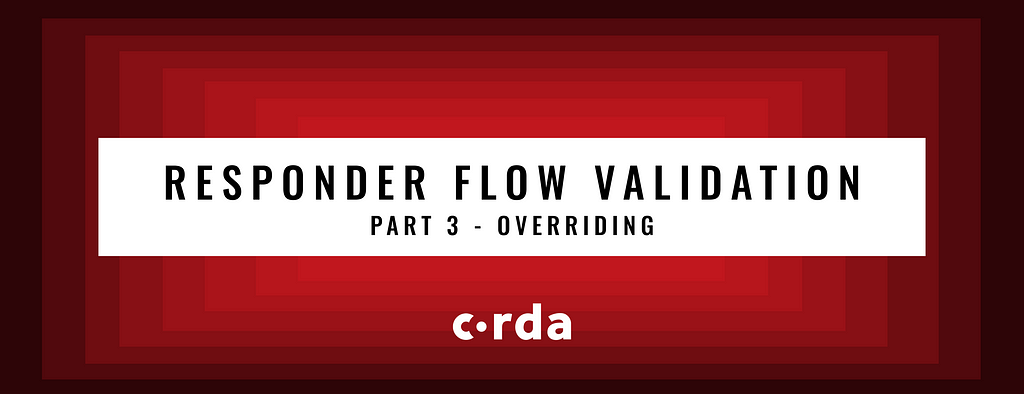Responder flow validation (part 3 — overriding)
January 06, 2020
Responder flow validation (part 3 — overriding)

To finish off my trilogy of blog posts on including validation inside your responder flows, I present to you the final topic. How to override a responder flow with your own custom implementation. You will need to go down this route if you are leveraging an external CorDapp that does not allow you to extend their flows. It is not ideal, as you will not be able to make use of any of the responder code that was written. But, at least it will provide you with a way to implement your requirements while still allowing your version to communicate to the paired initiating flow. To cement what I am saying, I will say it one more time, you should only override if you cannot extend.
Before I get to the good stuff and show you what you need to do, if you really do need to go down this route, you should send an angry email to whoever wrote the CorDapp you are utilising. Moreover, you can tell them to read Responder flow validation (part 2 — extension) with some passive-aggressive message to go along with it ?.
The content of this post is really a rehashing on what I already wrote in Extending and Overriding Flows from external CorDapps, except that I will focus precisely on overriding a responder flow.
When to override
So what sort of flow will you need to override?
Below is a flow that cannot be extended:
@InitiatedBy(SendMessageFlow::class)
class SendMessageResponder(private val session: FlowSession) : FlowLogic<SignedTransaction>() {
@Suspendable
override fun call(): SignedTransaction {
val stx = subFlow(object : SignTransactionFlow(session) {
override fun checkTransaction(stx: SignedTransaction) {
}
})
return subFlow(ReceiveFinalityFlow(otherSideSession = session, expectedTxId = stx.id))
}
}
As this flow is written in Kotlin, the class is final and cannot be extended. In Java, the class would need to be marked as final explicitly to prevent you from extending it. In other words, all language rules around extending classes apply here and nothing else. If you tried to write a new flow that extended the one above, you would find a few compiler errors blocking your way.
Since this flow cannot be extended, the only solution is overriding it (or not using it at all).
How to override
To override the flow, you must do the following:
- Write your own flow from scratch
- Include @InitiatedBy and reference the initiating flow that your implementation should respond to
- Add the flowOverrides configuration to your node.conf
Once these steps are taken, the node will start routing all calls to the original responder flow to your custom implementation.
Let’s look into each point a bit further:
- Write your own flow from scratch
@InitiatedBy(SendMessageFlow::class)
class ValidatingSendMessageResponder(private val session: FlowSession) : FlowLogic<SignedTransaction>() {
@Suspendable
override fun call(): SignedTransaction {
val stx = subFlow(object : SignTransactionFlow(session) {
override fun checkTransaction(stx: SignedTransaction) {
val message = stx.coreTransaction.outputStates.single() as MessageState
check(message.recipient == ourIdentity) { "I think you got the wrong person" }
check(!message.contents.containsSwearWords()) { "Mind your language" }
check(!message.contents.containsMemes()) { "Only serious messages are accepted" }
check(message.sender.name.organisation != "Nigerian Prince") { "Spam message detected" }
}
})
return subFlow(ReceiveFinalityFlow(otherSideSession = session, expectedTxId = stx.id))
}
}
Note that there is no mention of the original responder flow
- Include @InitiatedBy and reference the initiating flow that your implementation should respond to
@InitiatedBy(SendMessageFlow::class)
class ValidatingSendMessageResponder(private val session: FlowSession) : FlowLogic<SignedTransaction>() {
- Add the flowOverrides configuration to your node.conf
flowOverrides {
overrides=[
{
initiator="dev.lankydan.tutorial.flows.SendMessageFlow"
responder="dev.lankydan.tutorial.flows.ValidatingSendMessageResponder"
}
]
}
This links SendMessnageFlow to ValidatingSendMessageResponder instead of the original SendMessageResponder
- You can also add this configuration to the deployNodes build task:
node {
name "O=PartyB,L=London,C=GB"
p2pPort 10003
flowOverride(
"dev.lankydan.tutorial.flows.SendMessageFlow",
"dev.lankydan.tutorial.flows.ValidatingSendMessageResponder"
)
}
When all these steps have been made, you should see a similar line in your node’s log file:
[INFO ] 2020-01-05T10:07:03,093Z [main] internal.NodeFlowManager. - Registered dev.lankydan.tutorial.flows.SendMessageFlow to initiate dev.lankydan.tutorial.flows.ValidatingSendMessageResponder (version 1)
This shows that the flow has been successfully switched out for the overridden version.
Forgetting to make step 2 or 3 will lead to errors.
- Forgetting to add the @InitiatedBy annotation will cause the node to keep using the original flow
- Forgetting to include the flowOverrides configuration will lead to an error due to multiple flows with the same @InitiatedBy annotation:
[ERROR] 2020-01-05T10:07:35,276Z [main] internal.NodeStartupLogging. - Exception during node startup: Unable to determine which flow to use when responding to: dev.lankydan.tutorial.flows.SendMessageFlow. [dev.lankydan.tutorial.flows.SendMessageResponder, dev.lankydan.tutorial.flows.ValidatingSendMessageResponder] are all registered with equal weight.
Conclusion
That brings us to the end of this trilogy of blog posts on responder flow validation.
- Starting with why you should include validation in Responder flow validation
- With the sequel detailing how to write flows that can be extended in Responder flow validation (part 2 — extension)
- Finally ending with this post on overriding responder flows
You should now have a good understanding of why you should include validation in your responder flows, how to write extendable flows for other developers to leverage and how to override a flow if can’t be extended.
If you enjoyed this post or found it helpful (or both) then please feel free to follow me on Twitter at @LankyDanDev and remember to share with anyone else who might find this useful!
Originally published at https://lankydan.dev on January 6, 2020.
Responder flow validation (part 3 — overriding) was originally published in Corda on Medium, where people are continuing the conversation by highlighting and responding to this story.